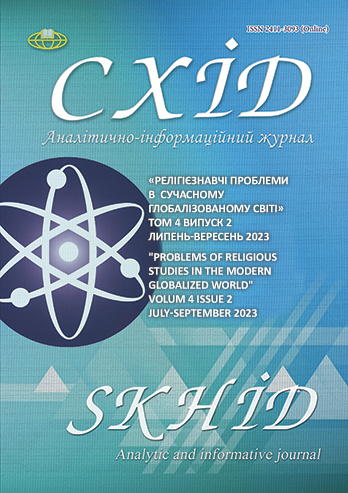Sanctity and quality as the conceptual basis of the value of life doctrine in the bioethical discourse
DOI:
https://doi.org/10.21847/2411-3093.2023.4(2).290301Keywords:
life, value, person, concept, discourse, bioethics, quality of life, sacredness, sanctity of life, moralityAbstract
The article offers a study of the bioethical discourse regarding the value of life through the prism of conceptualizing the main approaches to the study of this phenomenon. It is noted that with all the diversity of approaches that demonstrate a wide range of views on the value of life, the modern bioethical discourse com-bines the ideas of scientific research, the dogmatics of religious doctrines and the basic principles of moral imperatives, which are interpreted in a civilized soci-ety in the context of medico-biological problems of life preservation and repro-duction, as well as determining its value. This combination is far from being ec-lectic. It synthesizes the main achievements of scientific, religious and ethical thought and extrapolates them to the problem of human life, which is a unique phenomenon that should be separated into a specific system of moral norms and imperatives of human activity. The article notes that in modern conditions the bioethical discourse is concentrated around the axiological paradigm in the study of living beings. All the diversity of viewpoints is proposed to be grouped into two main approaches: the ethics of the sacredness (sanctity) of life and the the quality of life ethics. The conceptualization of these two main approaches permits to consider all the diversity of views on the value of life in the context of bioethi-cal discourse as a systematized set of views, which contributes to the creation of an appropriate scientific research situation and will contribute to the deepening of scientific studies on the specified subject.
Downloads
References
Bowling, L. (2001). Measuring disease a review of disease specific quality of life measurement scales. Buckingham. Philadelphia: Open University Press.
Durkheim, E. (1954). The Elementary Forms of Religious Life. (J. Swain, Trans.) New York: The Free Press.
Eliade, M. (2001). Svyashchenne i myrske [Sacred and Secular]. Kyiv, Vydavnytstvo Solomiyi Pavlychko «OSNOVY» (In Ukrainian)
Filosofski zasady medychnoyi teoriyi i praktyky. Materialy naukovoho sympoziumu (2018). Kyiv, Grafika I dyzayn (In Uktainian)
Horban, O. & Martych, R. (2018). Axiological deter-minants of the doctrine of “living” in modern bioethic discourse. Studia Warmińskie, 55, 93-106.
Horban, O., & Martych, R. (2020a). The Idea of Living in Religious-Philosophical Discourse. Studia Warmińskie, 57, 101-115. https://doi.org/10.31648/¬sw.6008
Horban, O., & Martych, R. (2020b). Fenomen zhyvoho v relihiyno-filosofskykh ideyakh skhidnoyi patrystyky. Scientific journal of M.P. Dragomanov National Pedagogical University. Series 7. Religious studies. Culturology. Philosophy № 42 (55), 3-10 (Ukrainian).
Horban, O., & Martych, R. (2022a). The Basic Approaches to the Value of Life in Bioethical Discourse. Studia warmińskie, 59, 87-96. https://doi.org/10.31648/¬sw.8328
Horban, O., & Martych, R. (2022b) The dynamics of bioethical discussion in religious and philosophical doctrines about the living. SKHID, Vol. 3 (4) 2022, p. 63-69. https://doi.og/10.21847/1728-9343.2022.3(4).269436
Jenkinson, С. (2023). Quality of life. Encyclopaedia Britannica. URL: https://www.britannica.com/topic/quality-of-life/
Reich, W. T. (1978). Quality of Life. In W. T. Reich (Ed.), Encyclopedia of Bioethics in 4 vols. (Vol. 2, pp. 829–831). New York: Free Press.
Sleczek-Czakon, D. (2004). Problem wartosci I jakosci zycia v sporach bioetycznych. Katowice: Wydawnictwo Uniwersytetu Slaskiego, 261 s.
Teylor Ch. (2013). Sekulyarna doba [Secular age]. Vol.1. Kyiv, Dukh i litera (In Ukrainian).
Warren, M.A. (2001). On the Moral and Legal Status of Abortion. In: T.A. Mappes (ed.), D. Degrazia (ed.). Biomedical Ethics. N.-Y.: McGraw-Hill.
Downloads
Published
How to Cite
Issue
Section
License
Copyright (c) 2023 Руслана Мартич, Олександр Горбань

This work is licensed under a Creative Commons Attribution-NonCommercial-NoDerivatives 4.0 International License.
1. Authors bear responsibility for the accuracy of facts, quotations, numbers and names used.
2. Manuscripts are not sent back.
3. The publisher does not always agree with the authors' opinion.
4. The authors reserve the right to authorship of the work and pass the first publication right of this work to the journal under the terms of a Creative Commons Attribution-NonCommercial-NoDerivatives 4.0 International License. This license allows others to distribute (copy) the published work for non-commercial purposes, provided there is mandatory attribution to its authors and a link to the first publication in our journal.
5. The authors have the right to conclude separate supplement agreements that relate to non-exclusive work distribution in the form in which it has been published by the journal (for example, to upload the work to the online storage of the journal or publish it as part of a monograph), provided that the reference to the first publication of the work in this journal is included.

